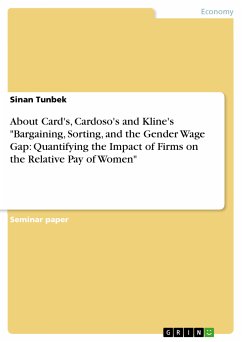Seminar paper from the year 2016 in the subject Economics - Case Scenarios, grade: 2,7, University of Mannheim, course: Economic Policy Evaluation - Female labor supply, fertility, mother's careers and public policy, language: English, abstract: Since the main focus of this seminar is on female labor supply the relative wage of women is an important factor. Over the past 100 years women labor force participation increased sharply and women are often even higher educated than men. Despite these facts there is still a huge wage gap between female and male workers in virtually all developed countries. Equal access to jobs and equal treatment within a firm by gender is guaranteed by legislation in most of the developed economies, still firms pay female and male workers differently. The bargaining and sorting effect may contribute to these differences. The former effect suggests that women may negotiate less aggressively than men and therefore receive a smaller share of the surplus generated by their job. The latter effect suggests that women tend to move to lower-paying jobs. Since there was no comprehensive economic research of both strands the underlying Card et al. provides the first comprehensive analysis of the impact of firm-specific pay premiums on the gender wage gap.
Dieser Download kann aus rechtlichen Gründen nur mit Rechnungsadresse in A, B, BG, CY, CZ, D, DK, EW, E, FIN, F, GR, HR, H, IRL, I, LT, L, LR, M, NL, PL, P, R, S, SLO, SK ausgeliefert werden.









